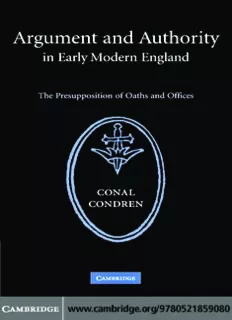
Argument authority early mod england PDF
Preview Argument authority early mod england
This page intentionally left blank Argument and Authority in Early Modern England Conal Condren offers a radical reappraisal of the nature of moral and political theory in early modern England through an examination of widespread arguments about office. The vocabulary of office-holding andabusewassufficientlysuppleandpervasiveforustoinferageneral presuppositionofofficecoheringthewholespectrumofsocialdiscourse, fromconceptualisingthesoultounderstandingtheresponsibilitiesofthe philosopher,poet,parentandpriest.Theexplorationofthisvocabulary involvesa reconsideration of the nature of early modern social debate, challenging fashionable preoccupations with emerging ideologies and with liberalism, liberty, republicanism, a public sphere, and reason of statetheory,throughwhichstudyofseventeenth-centurypoliticaltheory has been organised. Indeed, the very idea of early modern political theory is called into question. Professor Condren reconsiders the im- portance of oath-taking, and analyses anew the three great crises of oath-takingthatpunctuatedEnglishhistoryintheseventeenthcentury. Again,hisconclusionschallengewidelyheldbeliefsaboutearlymodern politicalargument,theprocessofsecularisation,andtheriseofdefacto theory. Argument and Authority is a major new work from a senior scholar of early modern political thought, of interest to a wide range ofhistorians,philosophersandliteraryscholars. CONAL CONDREN is Scientia Professor in Politics and International RelationsattheUniversityofNewSouthWales,Australia. Argument and Authority in Early Modern England The Presupposition of Oaths and Offices Conal Condren TheUniversityofNewSouthWales cambridge university press Cambridge, New York, Melbourne, Madrid, Cape Town, Singapore, São Paulo Cambridge University Press TheEdinburghBuilding,Cambridgecb22ru,UK Published in the United States of America by Cambridge University Press, New York www.cambridge.org Informationo nthi stitle :www.cambri dge.org/9780521859080 ©ConalCondren2006 Thispublicationisincopyright.Subjecttostatutoryexceptionandtotheprovisionof relevantcollectivelicensingagreements,noreproductionofanypartmaytakeplace withoutthewrittenpermissionofCambridgeUniversityPress. Firstpublishedinprintformat 2006 isbn-13 978-0-511-16838-3 eBook(EBL) isbn-10 0-511-16838-1 eBook(EBL) isbn-13 978-0-521-85908-0 hardback isbn-10 0-521-85908-5 hardback CambridgeUniversityPresshasnoresponsibilityforthepersistenceoraccuracyofurls forexternalorthird-partyinternetwebsitesreferredtointhispublication,anddoesnot guaranteethatanycontentonsuchwebsitesis,orwillremain,accurateorappropriate. To Averil Contents Preface page ix Introduction 1 Part I:The liquid empire ofoffice 1 An overvi ew 15 2 Ceremonies of office: The kiss of thetutti-man 36 3 Institutionalised office:a sense of the scavenger 54 4 The vocabularyof office 80 5 Offices ofthe intellect: player,poetand philosopher 105 6 Soul and conscience 125 Part II: The authority and insolence ofoffice 7 The cases of patriot and counsell or 149 8 Cas uistry as the media tion of office 172 9 The case of resistance tosuperior power 186 10 Metaphorandpolitical autonomy 209 Part III: ‘I, A.B.’ 11 An overview ofthe oath in seventeenth-centuryargument 233 12 Coronation oaths 254 13 The oathof allegiance of 1606 269 vii viii Contents 14 Engagement with afree state 290 15 The oath ofallegiance and theRevolution of1688–9 314 Epilogue 343 Bibliography 353 Index 391
Description: